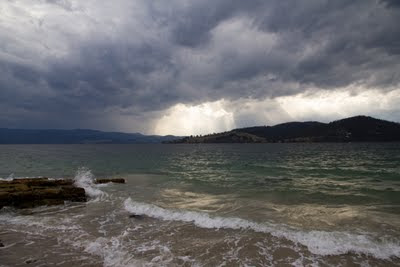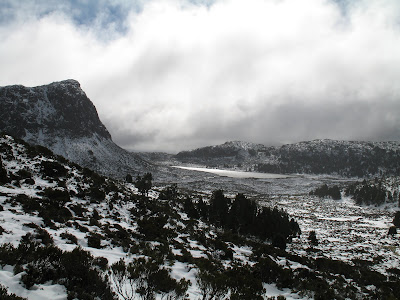This afternoon the bush track is different. I know it well, I walk here two or three times a week, and yet I am suddenly uncertain which turn leads where. My steps have become tentative, feet threatening to roll on the uneven ground; eyes darting left and right; hands out ready for a fall; breath coming a little heavier; ears half-listening for threat.
It is the light dying. Our days are shortening, our nights attenuating. The chill air is asserting itself. Even the garden is telling me that we have gone beyond Keats’ season of mists and mellow fruitfulness.
Today, having deliberately caught the wrong bus so I could walk down through the bush to my home, I find it almost too dark to negotiate my familiar but steep bush. It is an unwelcome reminder: for the next few months I will be arriving home in the dark.
 |
Autumn storm clouds gather over the D'Entrecasteaux Channel, Tasmania |
Thoughts of migration begin whispering in the heart. This morning a mass of short-tailed shearwaters, over a hundred strong, was visible from our deck. They are the last of their kind to leave, fledglings grown fat on a fish diet provided by devoted parents. They are sometimes too heavy to fly, and must exercise off some podge by flying around the coastal hills. Within days they will begin their phenomenal 15 000 kilometre migration to north Asia and Alaska.
Their wonky, whirling flight briefly awakes something in me too. I think of fellow Hobartians who head north every winter, keen to follow the sun. Most of us make do with the promise of some surrogate sun in the hearth, by ensuring that our wood supply is ready. If it is only a consolation, it is a delicious one.
Despite fleeting thoughts of winged escape, I love autumn. Its crisp nights and clear days, its galleon clouds and galloping winds all portend the longed-for possibility of snow.
 |
An autumn snowfall blankets the Walls of Jerusalem National Park, Tasmania |
Yet I find a subtle down-cast in my mood. An inexplicable sense of loss and melancholy grows with the dying of the light. Thirty years of experience in the south of this island tells me that winters here are seldom hard; that active outdoor life will continue despite the cold; that wild weather is beautiful; that the garden can still be worked, and will still bring forth produce.
Regardless of what the rest of Australia imagines, Tasmania has a mild maritime climate. Certainly our latitude south is similar to that of northern places like Toronto and Vladivostok. But in terms of weather, there’s no comparison. Our temperatures stay regulated by the (milder) oceans.
So I know there will be no Siberian – or Ontarion – winter extremes to deal with in the coming months. And yet I still find it hard to shake the melancholic edge that hovers around my thoughts as May days descend towards night.
 |
Autumn and winter: fine for fungi, as here in Mt Field National Park, Tasmania |
Rather than “snap out of it”, I decide to sit with the feeling, allowing it to play with me for a while. A shower of bullet-like rain spatters on the roof. Squalls rush in from the south. Although the light is fading fast, I can make out that snow is engulfing the highest parts of Kunanyi /Mt Wellington. Tonight will be a cruel one for some of the mountain’s creatures.
I begin to see that for me dark and cold and winter are signs of loss, decline and even death. These are not topics most of us enjoy facing, but they are realities. And they are undeniably sad. But I also begin to see that within the same there are possibilities of renewal.
I think of Albert Camus’ meditation on winter: "In the depth of winter I finally learned that there was in me an invincible summer." It may take the heat of an artificial sun and the support of family and friends, but I – like most of us – will get through this winter. And in recognising my own decline and death in its gentle jaws, I also somehow recognise the power and wonder of being alive: perhaps a personal migration.
No comments:
Post a Comment